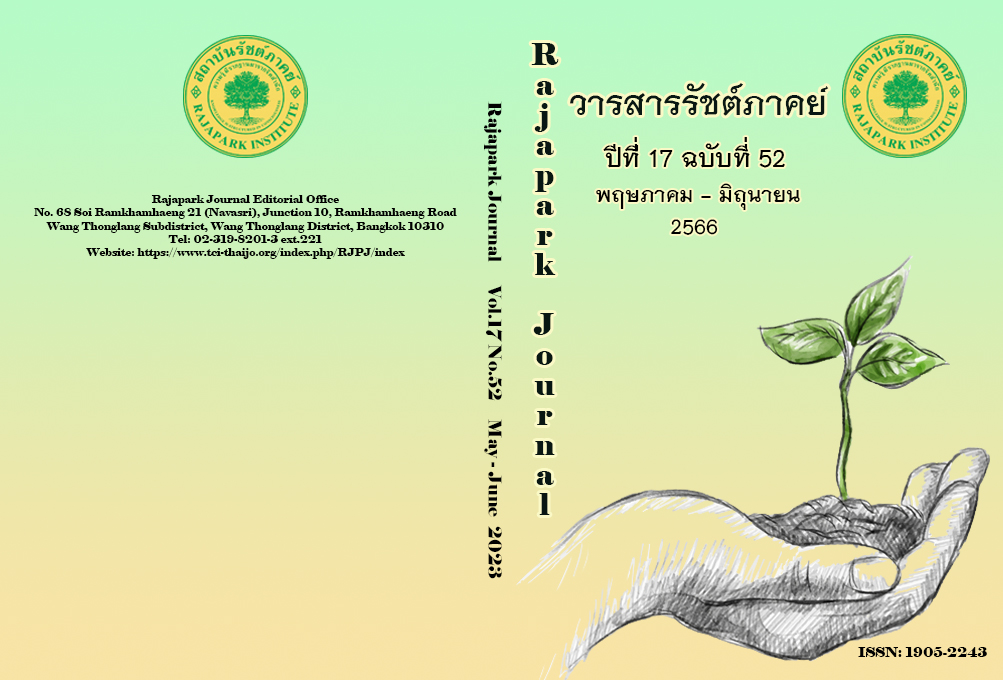The Cancellation of Trademark Registration in Bad Faith
Main Article Content
Abstract
The purpose of this research is to study 1) fundamental concepts on the intellectual property of trademarks, 2) related laws concerning trademark protection and prohibitory characteristics for registration of trademarks intended in bad faith, and 3) interpretation problems of trademarks prohibited for registration under Section 8(9) of The Trademark Act B.E. 2534. This research analyzes and compares academic information, journals, academic articles, seminar reports, updates from public and private sectors, laws, court judgments, and etc. regarding the interpretation of The Trademark Act B.E. 2534. It appears that Thai law has no legislation for refusing the registration of trademarks intended in bad faith. Consequently, this leads to legal complications as follows; (1) the interpretation problems of trademarks intended in bad faith, (2) the law enforcement against the spirit of the law requiring consideration of trademarks with distinctiveness only, and (3) the refusal of registration of trademarks intended in bad faith creating controversial directives. The first directive accounts that refusing the registration of trademarks intended in bad faith follows Section 8(9). On the other hand, the other directive accounts that refusing the registration of trademarks intended in bad faith violates Section 8(9).
Article Details

This work is licensed under a Creative Commons Attribution-NonCommercial-NoDerivatives 4.0 International License.
Views and opinions appearing in the Journal it is the responsibility of the author of the article, and does not constitute the view and responsibility of the editorial team.
References
Abbott, F.M. (2021). Protection First World Assets in the Third World: Intellectual Negotiations in the GATT Multilateral Framework. Vanderbilt Journal of Transnational Law, 22(4), 739. https://scholarship.law.vanderbilt.edu/vjtl/vol22/iss4/1/
Fox, A., & Nielen, M. (2016). Fight Unfair Competition in the UK and Germany: An Anglo-German Perspective. Maucherjenkins. https://www.maucherjenkins.com/commentary/fighting-unfair-competition-in-the-uk-and-germany-an-anglo-german-perspective
Halpern, S.W., Nard, C.A., & Port, K.L. (2011). Fundamentals of United States Intellectual Property Law: Copyright, Patent, Trademark (3rd ed.). Kluwer Law International.
Hemaratchata, C. (2019). Intellectual Law Properties. Nitithamlawbooks.
JPO. (2021, Nov 21). Report on “Laws and Examination Guidelines/Practices of the TM5 Offices against Bad-Faith Trademark Filings”. TM5 Five Trademark Offices. http://tmfive.org/continuationexpansion-of-bad-faith-project/
Keon, J. (1998). Intellectual Property Rules for Trademark and Geographical Indication: Important Parts of the New World Trade Order: In Carlos M. Correa, & Abdulqawi A. Yusuf, (2016). Intellectual Property and International Trade, The TRIPS Agreement (3rd ed.). (pp.168), Kluwer Law International.
Reiss, S.M. (2018). Commentary on the Paris Convention for the Protection of Industrial Property. Lex-IP.com. http://www.lex-ip.com/Paris.pdf.
Rowlands, J., Ash, S.C., Bey, C., Aylen, D., Parker, J., & Swaine, K. (2019, January 31). Bad Faith Trademark Applications. Gowling WLG. https://gowlingwlg.com/en/insights-resources/articles/2019/bad-faith-trademark-pplications/
Tsoutsanis, A. (2011). Trademark Registration in Bad Faith. Oxford University Press.
Wenman, E.R. (1982). Trademark Right. In WIPO COLOMBO Trademark Symposium, 39. https://www.wipo.int/edocs/pubdocs/en/wipo_pub_642.pdf
Wetchayanont, W. (2000). The essence of the Trademark Act (No. 2) B.E. 2543. In The Intellectual Property and International Trade Law Forum: Special Issue 2000. Central Intellectual Property and International Trade Court, Thailand.


